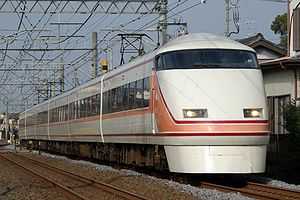Tobu 1800 series
| Tobu 1800 series | |
|---|---|
 Set 1819 on a seasonal Rapid service, May 2007 | |
| In service | 1969–Present |
| Constructed | 1969–1987 |
| Number in service | 6 cars (1 set) |
| Formation | 6/8 cars per trainset |
| Operator | Tobu Railway |
| Line(s) served | Tobu Skytree Line |
| Specifications | |
| Car body construction | 20 m (65 ft 7 in) |
| Doors | One per side |
| Maximum speed | 110 km/h (70 mph) |
| Acceleration | 2.2 km/h/s |
| Deceleration |
3.7 km/h/s (service) 4.5 km/h/s (emergency) |
| Electric system(s) | 1,500 V DC |
| Current collection method | Overhead wire |
| Track gauge | 1,067 mm (3 ft 6 in) |
The Tobu 1800 series (東武1800系 Tōbu 1800-kei) is an express electric multiple unit (EMU) train type operated by the Tobu Railway in Japan since 1969.
Formation
| Car No. | 1 | 2 | 3 | 4 | 5 | 6 |
|---|---|---|---|---|---|---|
| Designation | Tc | M | T | M | M | Tc |
| Numbering | 1860 | 1850 | 1840 | 1830 | 1820 | 1810 |
Car 4 is fitted with two scissors-type pantographs, and car 2 is fitted with one.[1]
Interior
-

Interior view of set 1819, May 2007
History
The first 1800 series trains entered service on 20 September 1969 on new Ryōmō express services from Asakusa in Tokyo to Akagi in Gunma Prefecture.[2] 18 8-car sets were built between 1969 and 1973. An additional set, 1819, was built in 1987 as a 6-car set to provide increased capacity.[3]
All cars were made no-smoking from 18 March 1995.[1]
With the appearance of the new 250 series EMU, the 1800 series sets were removed from regular Ryōmō services from 1 April 1998. The remaining set, 1819, was subsequently used for charter trains and seasonal extra services.
Conversions
300/350 series

From 1990, two 1800 series sets were modified to become 6-car 300 series sets, and from 1991, three more sets were modified to become 4-car 350 series sets. These entered service from 21 July 1991, replacing 6050 series on express services on the Nikkō Line.[3]
Commuter version

Three sets (1811–1813) were kept in storage next to Tatebayashi Station from April 1998 following their withdrawal from Ryomo services. These were subsequently shortened to 4-car sets and modified for use on commuter services on the Sano Line and Koizumi Line from 23 April 2001, allowing ageing 5000 series EMUs to be withdrawn. Conversion involved arranging the seats in fixed 4-seat facing bays, removal of the vestibule partitions, and repainting in the Tobu commuter stock colour scheme of white with blue bodyline stripes.[2] These sets were finally withdrawn in early 2007.
References
- ↑ 1.0 1.1 私鉄車両編成表 2010 [Private Railway Rolling Stock Formations - 2010]. Japan: JRR. August 2010. p. 35. ISBN 978-4-330-15310-0.
- ↑ 2.0 2.1 "2006東武鉄道通勤車両カタログ" [2006 Tōbu Railway Commuter Rolling Stock Catalogue]. Tetsudō Daiya Jōhō Magazine (Kōtsū Shimbun) 35 (263): p21–26. March 2006.
- ↑ 3.0 3.1 "2006東武鉄道優等車両カタログ" [2006 Tōbu Railway Express Rolling Stock Catalogue]. Tetsudō Daiya Jōhō Magazine (Japan: Kōtsū Shimbun) 35 (264): p27–28. April 2006.
External links
| Wikimedia Commons has media related to Tobu 1800 series. |
- Tobu 1800 series set 1819 (Japanese)
| |||||||||||||
